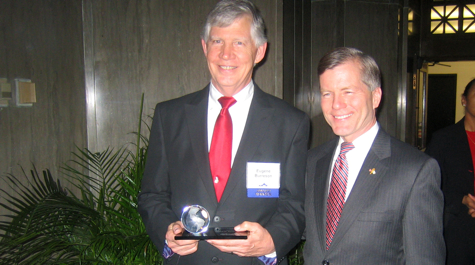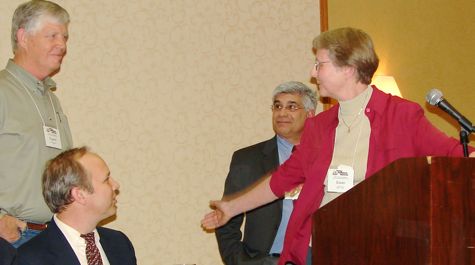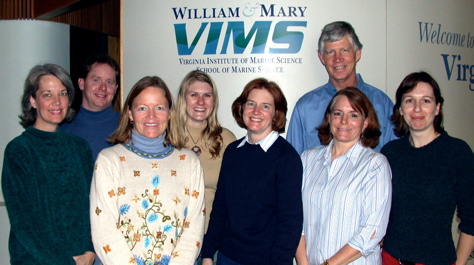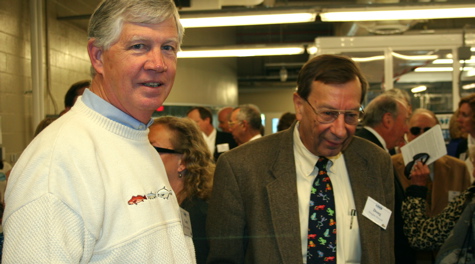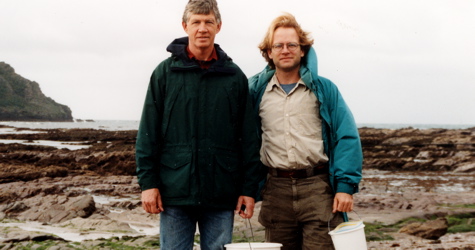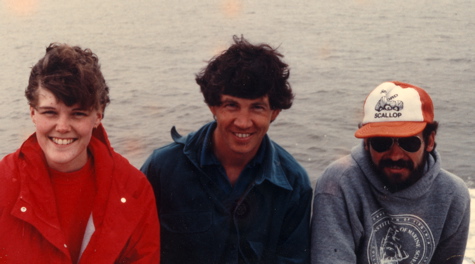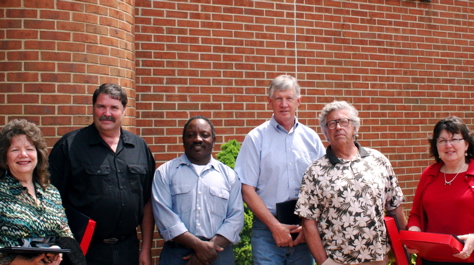Governor honors VIMS professor as Outstanding Scientist
Dr. Eugene Burreson, an emeritus professor at the Virginia Institute of Marine Science, has received one of three Outstanding Scientist awards for Virginia for 2010.
The award is bestowed annually by the Governor's Office and the Science Museum of Virginia to honor those who have excelled in research and commitment to science, and whose contributions to scientific research have extended the boundaries of their own and other fields.
Governor Bob McDonnell presented the awards during a legislative reception at the Museum on the evening of January 28.
Burreson, who retired as Chancellor Professor of Marine Science at VIMS on January 1, spent 34 years at the Institute. An internationally recognized shellfish pathologist, Burreson was a pioneer in the study of MSX and Dermo—diseases that have helped push Chesapeake Bay's oyster population to one percent of historical levels, and that are caused by parasites whose relatives affect oyster stocks worldwide.
Burreson's expertise was recognized in 2001 when the Office International de Epizooties (OIE) designated his Shellfish Pathology Laboratory at VIMS as the international OIE Reference Laboratory for these diseases, and again in 2009, when he received the Honored Life Member Award from the National Shellfisheries Association.
Dr. John Wells, Dean of the School of Marine Science at W&M and Director of VIMS, says "We were delighted to hear that Gene had been selected for this most prestigious award. This is a wonderful honor that reflects a lifetime of scientific achievement by one of our most dedicated faculty members."
Dr. Roger Mann, Director of Research and Advisory Service at VIMS, says "Gene is internationally recognized for his achievements in shellfish science, and is one of the most significant figures in shellfish pathology worldwide. He is truly deserving of the Governor's award."
Burreson's study of the biology, genetics, and transmission of the parasites that cause MSX and Dermo has been instrumental in the on-going effort to breed disease-resistant strains of the native oyster Crassostrea virginica. VIMS now offers several lines of disease-resistant oyster stock to shellfish growers throughout the mid-Atlantic.
Burreson and colleagues also lead an ongoing, 50-year study showing that Chesapeake Bay oysters are developing resistance to MSX and Dermo, despite the increasing prevalence in the Bay of the parasites that are responsible for the two diseases. MSX results from an infection by the single-celled protozoan Haplosporidium nelsoni. Dermo is caused by the parasite Perkinsus marinus.
From 2003 to 2009, Burreson and his lab played a key role in evaluating the potential introduction of non-native oyster species to Chesapeake Bay, particularly in regards to understanding the emergence of the Bonamia parasite in experimental trials of Asian oysters in North Carolina.
During his career, Burreson authored more than 70 publications related to shellfish diseases, and 50 more on fish parasites. One of many seminal studies was his 2000 paper in the Journal of Aquatic Animal Health linking the appearance of MSX disease in Chesapeake Bay with a failed commercial introduction of the non-native oyster Crassostrea gigas during the 1950s.
Burreson also played a significant international role in managing shellfish health. His research has led to development of molecular tests that are used in laboratories around the world to detect shellfish pathogens. His program also works directly with governments and investigators worldwide to identify, detect, and manage shellfish pathogens and diseases. Many investigators from Europe, Africa, South America, New Zealand, and Australia have received skilled mentoring from Burreson and key training in his laboratory at VIMS.
Nearer home, Burreson works closely with the East Coast oyster and clam industries to prevent the spread of diseases through interstate shellfish transfers. His laboratory performs health examinations prior to most shellfish transfers to or from Virginia.
Burreson joins the late Dr. William Hargis and VIMS emeritus professor Jack Musick in receipt of a Governor's award from the Science Museum. Hargis was honored with Virginia's Lifetime Achievement in Science Award in 2003. Musick received the Lifetime Achievement award in 2008.

